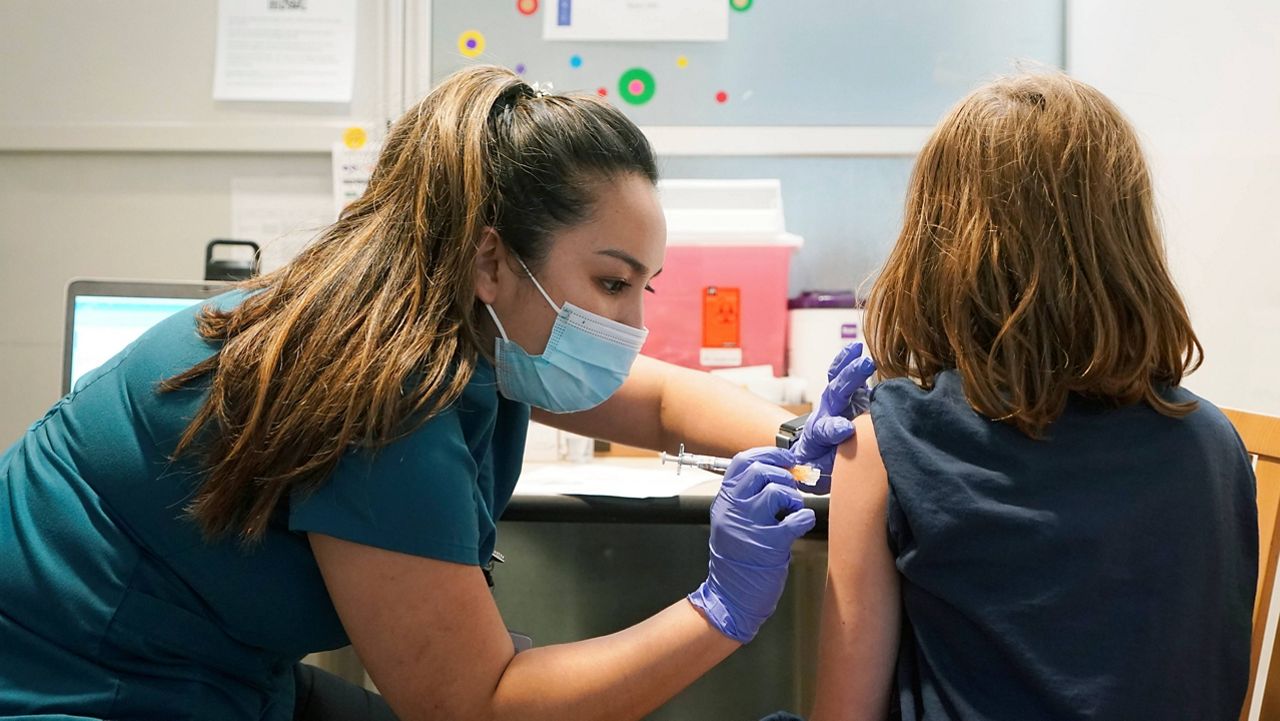Nearly 1 million children ages 5 to 11 will have received their first COVID-19 vaccination shot by the end of Wednesday, the Biden administration said.
What You Need To Know
- More than 900,000 children ages 5 to 11 will have received their first COVID-19 vaccination shot by the end of Wednesday, the Biden administration said
- Another 700,000 have scheduled their vaccination appointments through local pharmacies, said White House COVID-19 Response Coordinator Jeff Zients
- Zients said that the pace of child vaccinations is expected to increase as more sites open
- CDC Director Dr. Rochelle Walensky sought to reassure parents who might be hesitant to get their children vaccinated by comparing the death rates among children of other illnesses prior to vaccines hitting the market to COVID-19
During a news briefing Wednesday, federal health officials announced that more than 900,000 children who became eligible for Pfizer’s two-dose vaccine last week have been inoculated or will be in the coming hours. That accounts for more than 3% of the 28 million children who can now receive the shots.
Another 700,000 have scheduled their vaccination appointments through local pharmacies, said White House COVID-19 Response Coordinator Jeff Zients, who reiterated that the Biden administration has secured enough doses to vaccinate all elementary school-aged children.
“Our program for kids ages 5 through 11 is hitting full strength this week, with 20,000 trusted and convenient locations coming online,” Zients said.
Vaccination sites include doctors' offices, pharmacies, children’s hospitals, community health centers, rural health clinics, school-based clinics and mobile clinics.
Zients noted that Minnesota has launched 1,100 locations for children to get vaccinated, including at the Mall of America in Bloomington, which can administer up to 1,500 shots a day. And in New York City, more than 1,000 clinics at schools are planned this week.
Zients said that the pace of child vaccinations is expected to increase as more sites open.
CDC Director Dr. Rochelle Walensky, meanwhile, sought to reassure parents who might be hesitant to get their children vaccinated.
Walensky said the committee of outside advisers who voted in favor of the CDC recommending the shots for kids “is comprised of medical and public health experts from across the country, including pediatricians, professors, researchers and chief medical officers.”
“The committee members are also parents and grandparents who, after their vote, powerfully shared their personal excitement to vaccinate their own children and grandchildren, offering protection to those they love most,” Walensky said.
“Over the past week, I've been so encouraged by the stories and precious photos I have received personally and seen in the media of children getting vaccinated,” the CDC director continued. “I'm hearing from parents who are breathing a sigh of relief that their younger children ages 5 and up are now able to be protected against COVID-19. And I am seeing the joy in children who are excited to get vaccinated as a critical next step in getting their life back to normal.
“Still, I hear questions from some parents: ‘Is the vaccine safe? What are the risks of COVID-19? Should I vaccinate my own child?’”
Walensky presented a graph comparing the death rates among children from other illnesses in the year before CDC-recommended vaccines to prevent them hit the market. Three had died from Hepatitis A, six from meningococcus, and 16 from chickenpox. But 66 children ages 5 to 11 have died from COVID-19 in the past year, Walensky said.
“What is clear is that COVID-19 poses a significant risk to our children, with more than 2 million cases reported in children 5 to 11 since the start of the pandemic, and 66 deaths over the past year, as well as the risk of additional complications like MIS-C (multisystem inflammatory syndrome) in children and long COVID,” the CDC director said. “While children remain more resilient than adults to this virus, they still remain at risk, and with the help of vaccines, we can prevent COVID-19 and many other diseases that were once fatal.”
Walensky said having more children vaccinated will also help prevent outbreaks that could threaten keeping schools open for in-person learning. Extended school closures can be harmful to kids’ social and emotional well-being, she said.



